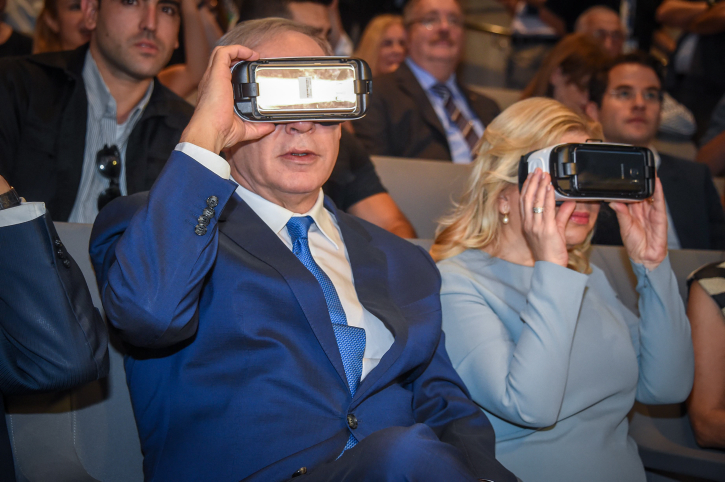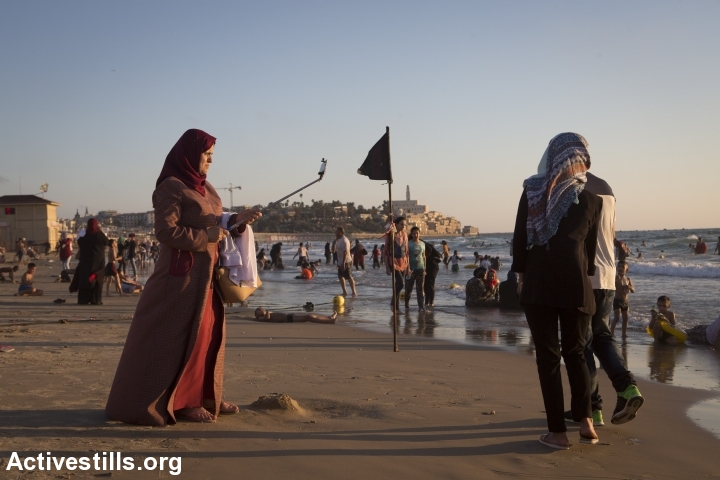Arabs are more present than ever in the Israeli public sphere, but attempts to marginalize them are growing at an even faster pace. A new law aimed at pushing Arab representatives out of the political system could wind up changing the rules of the game — in the worst possible way.

The Knesset this week passed a law that will enable it to expel Arab MKs from their positions as elected representatives. The same day, a storm erupted over a program on Army Radio that examined a poem by Palestinian poet Mahmoud Darwish. Both events have one thing in common: they highlight Israeli right wing’s hopeless desire to make the country’s pesky Palestinian population simply disappear. That’s no easy task considering that proportionally speaking, there are more Arab citizens in Israel than African Americans or Hispanic Americans in the United States. And can anybody even imagine a U.S. without them?
Those on the right in Israel will tell you that they don’t oppose the Arabs themselves, just their ideas. That is, of course, feigned naïveté. As long as Israel is defined as a Jewish state, Arabs will always feel alienated from it. An Arab can become Israeli like he or she can become German or American, but he cannot become Jewish, which Israeli Jews wouldn’t want either. That’s the fundamental difference between the Israeli model and the Western democratic model, where even if there sometimes exist symbols of Christianity or some other nation, Western democracies are ultimately based on the idea of “a state of all its citizens.” In Israel, that idea is so terrifying to people that some want to criminalize even advocating for it.
And yet despite this unusual model, Israel has managed to maintain a mostly democratic system within its pre-1967 borders (though never a liberal one). It worked, somehow, because of the pragmatic attitude adopted by both the Jewish majority and the Palestinian minority that survived 1948. For example, the unwritten compromise according to which Palestinians can vote and be elected, even if they oppose — quite naturally — the very idea of a Jewish state. Or that a Palestinian poet can be canonized even if, among other things, he wrote poems that portray Jews as the enemy, just as Israeli poets who saw Arabs as enemies enjoy an even more sacred stature.
What made it work was the separation that existed between the realm of culture and narrative, in which each nation holds on to their self-defined image of the world – sometimes to the extreme — and the tangible realm of actions, in which we all live together with various compromises and sometimes just by looking the other way. For the new Israeli Right, however, that isn’t enough. For them, the Jewish state needs to be completely Jewish in its culture, Jewish in its allocation of resources, Jewish in its political discourse, and so on. To be fair, that’s the spirit of the moment everywhere — we are living in an era that loves absolute justice, especially in the cultural sphere, and which scorns compromise. Among other reasons, that can also explain the rise of the nationalist Right across the globe.
But reality has its ways of breaking through the surface. Even if we all wake up one morning and cry to the heavens that this is a Jewish state that belongs only to the Jews, we won’t be able to simply ignore an entire quarter of Israel’s population. Israel is a already a binational state, including within pre-1967 borders, a fact that the Israeli Left and Right have always been united in denying. The Right’s defiance of that fact becomes particularly absurd when you consider its other project — the ongoing control of the occupied territories. The only reason the Right can live with these contradictions is that it never really internalized the very existence of the Palestinians, and that’s true on both sides of the Green Line.

To its credit, the Netanyahu government has been implementing a groundbreaking plan to invest in the Arab sector in Israel. However, the idea that you can separate economic improvement and integration from culture, politics, and communal life — the areas where segregation and Jewish supremacy are most closely safeguarded — has never worked anywhere and probably won’t work here either. If anything, there is evidence that making improvements to quality of life without granting the accompanying political rights can actually increase alienation. Whoever thinks that a new generation of Palestinian academics and educated professionals will agree to speak Arabic only inside their own homes and read their poetry clandestinely, doesn’t understand the world in which they live — and there’s a limit to how much Palestinian content Israel can convince Facebook to censor.
Still, I believe that the Netanyahu government will be able to maintain its current trends for the next few years. When Turkish President Erdogan can purge half of the civil service and Field Marshal Sisi can kill 800 protesters in a single day, the Mahmoud Darwish scandal on Army Radio and attempts to get rid of Haneen Zoabi probably aren’t going to ruffle too many feathers in the region, or even globally. But Israel’s problem isn’t the rest of the world; Israel’s problem is the reality within its own borders. Binational states are some of the most complicated projects to maintain. Binational states that deny their binational identity or those that think they can maintain their integrity by force — those states find themselves in far greater danger.
From an Israeli standpoint it would be much better if the Palestinians continue to express their alienation from within the parliament as opposed to outside it. It would be much better if Jewish academics discuss Mahmoud Darwish on Army Radio in their own words than if the army only broadcast songs and propaganda while underground poetry pushes people toward political action.
From a Palestinian perspective I don’t know which of those two arrangements is more problematic, but the Palestinian citizens of Israel are always dealt a crappy hand. The irony is that the State of Israel is giving them a doomsday weapon (politically speaking, of course): if an Arab elected official is expelled from the Knesset, Palestinian society in Israel will have very good reason to boycott the electoral process entirely. Nobody knows what might happen in such a scenario — even the Joint List is divided over its current strategy in the face of the threat of expulsion from the Knesset.
A total Arab boycott of the Israeli political system would change the political dynamics between Jews as well, not to mention the challenges it would pose to the legitimacy of the Israeli regime and the idea of a “Jewish and democratic state.” Israel would most definitely need to amplify the authoritarian nature of its rule over the Palestinian citizens, as they will no longer feel the need to play by the rules they accepted by participating in the political system. In the long run, those developments open the door to more violence between the two communities. Personally, I am terrified by the prospect of such a political disengagement, because I do not believe that there is any future in this land that doesn’t involve Jewish-Arab cooperation and even partnership.
Finally, a few words need to be said about the Israeli center-left, which for the most part granted legitimacy to the systematic persecution of the Palestinian minority in Israel and its outspoken politicians, particularly those from Balad. A good number of the anti-democratic laws we’re seeing these days, particularly those that deal with Palestinians, were initiated by members of the Labor Party and the now-defunct Kadima. There are some politicians in the Labor Party who have made careers out of politically harassing Haneen Zoabi. I guess they believe that once the Arabs are whipped into shape and Balad is done away with, that a center-left coalition can be formed with the support of “moderate” Palestinians. Ashrey Ha-ma’amin, we say in Hebrew. Happy is the believer. More likely is the possibility that we’ll find ourselves in an entirely different game.
This article was first published in Hebrew on Local Call. Read it here.

